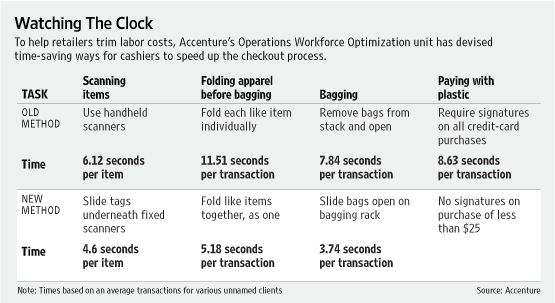Have you ever wondered why many stores now no longer require a signature when you make a purchase of $25 or less with a credit card? Today, I found out why.
It has to do with the pressure to increase employee efficiency. So how do you make employees more efficient? According to this article from the Wall Street Journal, you change practices. Consider:

Then, you start clocking employees. For example:
Daniel A. Gunther has good reason to keep his checkout line moving at the Meijer Inc. store north of Detroit. A clock starts ticking the instant he scans a customer’s first item, and it doesn’t shut off until his register spits out a receipt.
To assess his efficiency, the store’s computer takes into account everything from the kinds of merchandise he’s bagging to how his customers are paying. Each week, he gets scored. If he falls below 95% of the baseline score too many times, the 185-store megastore chain, based in Walker, Mich., is likely to bounce him to a lower-paying job, or fire him.
According to the article, the cost is, in large part, paid by the employee in the form of comfort on the job, the ability to make human contact with regular customers, and having to be mean to old ladies to get them to hurry up.
Jay Livingston has a nice analysis.

Comments 7
Noumenon — December 11, 2008
Timing the checkouts is really the only bad one they mention; the rest is stuff like "if you turn the banana box over before you open it, all the bananas come out stem up for easy grabbing."
Esme — December 11, 2008
McDonald's has been timing its employees for years. And for years, McDonald's employees have been cheating the system by clearing an order from the queue before it's been filled.
Rebecca — December 12, 2008
I used to work at a supermarket and they definitely timed us and then posted everyone's scores in the break room. The manager then highlighted the people's names with the shortest times. Instead of how long transactions took, they took the average time it took between each item was scanned; scores were actually like milliseconds off. I always wondered what they did with that information since we never got rewarded for doing well, only talked to or taken off register if our scan time was too slow.
Kari — December 12, 2008
I started working at Target this holiday season as a cashier. They time the transactions too. After each transaction a big "R" or "G" shows up on the screen to show if your speed was ok or not ("R" is bad, "G" is good). You also always have a running tally of the last 10 transaction scores along with your average total on your screen. What really sucks is that most of time my score is negatively affected by the customer, not by me. Every time someone waits to the last second to pull out their checkbook and write a check, or dig through their purse to find their debit/credit card, there goes my good score for that transaction.
For the record, I 've never been mean to an old person to get them to hurry up, LOL.
Village Idiot — December 12, 2008
One thing that might speed up the lines would be opening more checkout lanes. We've all been in some huge store waiting, and waiting, and waiting some more to get checked out while we stare at the long row of unused lanes wondering why only 2 or 3 out of 30 are open.
Also, the pressure a cashier feels by the act of timing the transaction seems to be left out of the equation, though it certainly has an effect on a cashier's performance and I'd wager is the most effective strategy to actually speed things up. That's not even considering the fact that your job can be put in jeopardy by an unusually high number of customers who want to write a check or count out exact change.
On the other hand, it's always going to suck to be a serf, or at least it will until the serfs get tired of playing that role, as I did when I left retail behind and never looked back.
Bonder — May 19, 2011
So basically this is service industry Taylorism.
Blix — December 12, 2011
Sad as this is, at least this means they still hire humans to work the register. Why is automated better again? Woo hoo saving 2 minutes!